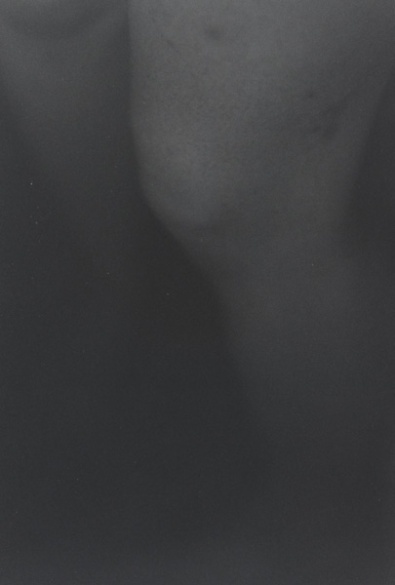Where the fuck was I going with this?
He imagines that she’s left the room for only a second. There is only a pause in his life. There is little room for time. Else saw him when she was gathering her things to leave. When she was there, he came to sit, to stare, to twist his body as only a skilled contortionist can because he knows it will only hurt her. Considering his name Bent, she formed his life around the parlor. This sad story about a grotesque figure, a misshapen human function. He was the ability to be still. A lack of life.
i.
Else thinks of her life as an unsuccessful death.
ii.
From the way he would curl himself backwards to close around her body when she was drunk, Else thought of him as the inner coil of her thoughts. As the figure of a collapsed ribcage. A reaching of something outside of herself. Bent turns his eyes in to film strips; a wall in which he feels his hands to wipe the sleep from her eyes, again.
He’s a pattern that changes from present to past. A symbol for the identity we lose through age.
iii.
Bent holds still enough to forget himself. He is Else, laid up against the bed, white and purple. She’s holding steady, afraid that if she were to touch the floor, only her hipbones would feel it. She’s rubbing her hands over the places of her that rise above her skin. Bent is touching his back and his hand goes through him.
iv.
There are frames surrounding stillness. Shoes left under a table are covered by glass, reflecting, hiding the flaws that get printed on them. The indent of toes, soles, a lack of an arch in the center. Her feet are always hurting and he watches the way she tips as she walks. Clinging to her dress to make it seem as though it’s only a way to stand more straight. This is a trial and error. Sundays are always filled with mistakes. A man who thinks of himself higher than a seat of any throne, a man who is an emperor, is still getting dressed in her room. Else’s eyes turn red and puffed. Tears are no longer worth the effort.
v.
Under her dress, she’s written the names of all the men that were there. The emperor is written in gold yet smudged from the way she walks. It is a sign, she tells herself, that he means as much as she does. Tissues remove his crowned name.
vi.
Dry eyes lose their vision. Else stops looking.
vii.
Outside, Bent builds himself over again. There are roses embedded in his skull and leaves to give him hair. He replaces his arms with tree branches. Else walks the halls inside wondering where her eyes have gone. She places a chair against the wall, climbs to stand on it, and feels the ceiling for eyes. She finds bulbs that turn on when placed inside her.
viii.
A flood passes through the cracks of the doors. Else and Bent lay on the floor, playing dead to pass time, waiting for anything to come. The rising water covers the top of their hands, laid flat. They’re on opposite ends of the room; Bent has one eye under the surface of the water, his head tilted just enough to see Else, whose damp shirt becomes invisible. An hour later, all that touches the floor are their fingers.
ix.
The carpet had turned to mold the months before. Bent slept in the ventilation all through the mornings. Else looked for him under cushions, in drains, between the shafts of light.
x.
A murder of crows just outside of everything.
xi.
Leaves bury children and Else remain leaning against her lies. Bent watches the fall building a slow sea for winter. Being alone is the human condition he keeps in secret. Else forgets the existance of time.
Bent hears the noise of an airplane but knows that Else can’t hear past the cold air.
